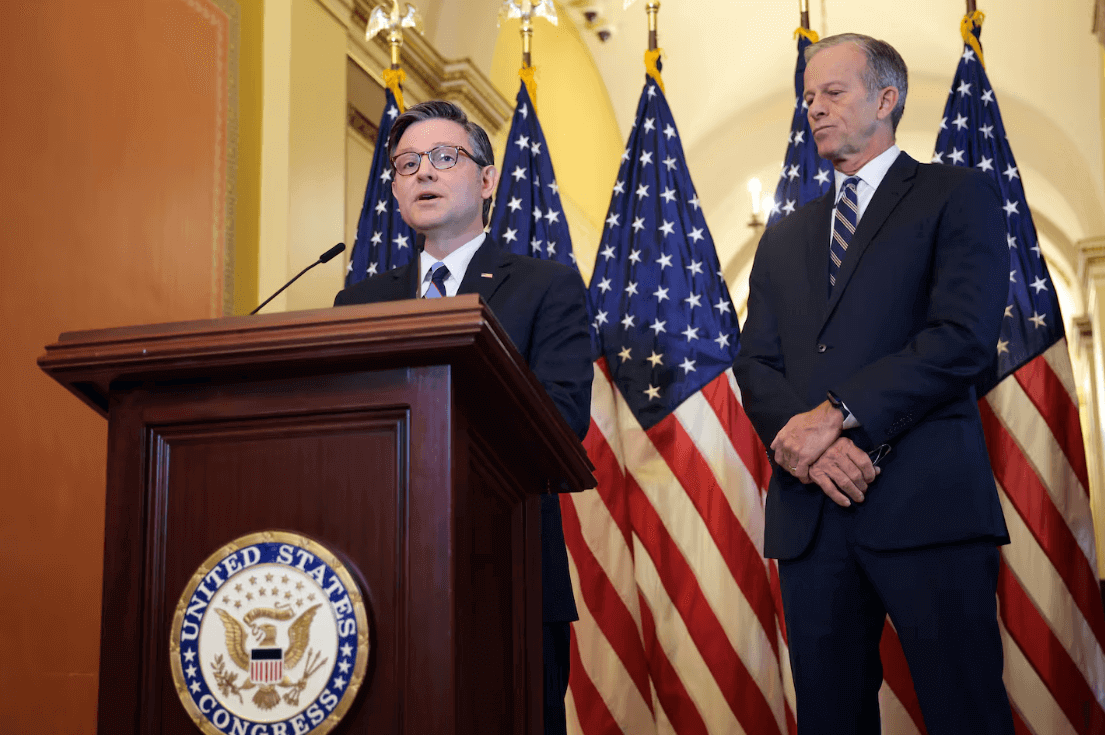众议院在与共和党反对派激烈争论后批准了特朗普预算法案框架

【中美创新时报2025 年 4 月 10 日编译讯】(记者温友平编译)众议院共和党人周四勉强通过了预算框架,这是政治上的一次转折,此前众议院议长迈克·约翰逊加班加点地满足了那些拒绝在不进一步削减开支的情况下推进数万亿美元税收减免的共和党顽固分子的要求。美联社LISA MASCARO 和 KEVIN FREKING对此作了下述报道。
约翰逊清晨与参议院多数党领袖约翰·图恩在国会大厦站在一起,支持唐纳德·特朗普总统提出的“宏大而美丽的法案”,并承诺寻求削减至少1.5万亿美元的联邦项目和服务。议长周三晚突然叫停了投票。
“我告诉过你们不要怀疑我们,”路易斯安那州共和党议员约翰逊随后说道。
他承认本周的经济动荡,因为金融市场“有点不稳定”。美国人“想知道国会是否在履行职责。我在这里告诉你们,我们确实在履行职责,”这位议长说道。
216票赞成、214票反对的投票结果推动了预算计划的推进,这对约翰逊来说又是一个里程碑,也是开启总统国内议程核心内容的漫长进程的下一步,这些议程包括减税、大规模驱逐出境和精简联邦政府。如果投票失败,尤其是在经济因特朗普的贸易战而动荡之际,将对华盛顿的执政党造成重大挫折。两名保守派共和党人投了反对票,所有民主党人也都投了反对票。
特朗普本周在一场正式的筹款晚宴上告诫共和党人“不要再在预算问题上哗众取宠”。
到周四早上,特朗普的语气已经发生了改变。
“美国历史上最大的减税!!!快了,”特朗普说。
众议院的行动仍需数周甚至数月才能最终敲定,国会还需要更多投票。约翰逊在共和党的微弱多数席位中,可能只会失去一些反对者。民主党作为少数派,缺乏足够的票数来阻止该方案,但他们已发出警告。
但到了周三下午,结果却变了。至少有十几名保守派共和党人(甚至更多)坚决反对该计划。其中包括极端保守派自由党团成员在内的几位共和党人,做出了罕见的举动:他们穿过国会大厦,与参议院共和党领导人私下会面,坚持要求进一步削减开支。
夜幕降临,众议院议事陷入停顿,约翰逊把一群共和党人拉进一间私人会议室。他们彻夜讨论各种替代方案,第二天早上又继续开会。
约翰逊说,共和党会议期间他与特朗普交谈了大约五分钟。
约翰逊说:“总统非常希望我们完成这件事。”
但众议院共和党保守派人士(包括本周与特朗普会面的几位人士)担心,参议院共和党上周末批准的蓝图并未将支出削减到他们认为有助于防止赤字飙升所需的水平。
德克萨斯州共和党众议员奇普·罗伊早些时候在社交媒体上发帖称:“这数字说不通。”
自由党团主席、马里兰州共和党众议员安迪·哈里斯 (Andy Harris) 带领其他人与参议员会面。
最终,哈里斯、罗伊以及几乎所有反对者都同意了。他们表示,约翰逊、图恩和特朗普向他们保证,未来将大幅削减开支。肯塔基州共和党众议员托马斯·马西和印第安纳州众议员维多利亚·斯帕茨投了反对票。
“我们尽了最大努力,”田纳西州共和党众议员蒂姆·伯切特说。“我们意识到它比我们自身更重要。”
投票之前,RSD 的 Thune 试图向众议院保守派保证,许多共和党参议员都支持他们削减开支的主张。
“我们肯定会尽一切努力,”图恩说。
但未来的细节至关重要。一些共和党关键参议员已经表示不赞成众议院提出的约8000亿美元削减计划,该计划可能会影响医疗补助计划和其他重要项目。
约翰逊曾试图坚称,数百万美国人赖以生存的医疗保健和其他服务,尤其是联邦医疗保险(Medicare)、医疗补助(Medicaid)和社会保障(Social Security),将不受任何影响。然而,共和党人却试图对福利施加新的限制,并削减他们所认为的浪费、欺诈和滥用行为,效仿亿万富翁埃隆·马斯克领导的政府效率部门。
众议院和参议院正处于将预算决议转化为立法文本的初始阶段,最终成果预计将于今年春季晚些时候或夏季公布。
纽约州众议院民主党领袖哈基姆·杰弗里斯表示,该预算计划是鲁莽和冷酷的,提议削减开支以给富人减税。
“我们来这里就是为了澄清,”杰弗里斯说,“别再管那些每天挣扎着维持生计的美国人了。”
预算框架的核心是共和党努力保留特朗普2017年第一任期内批准的税收减免政策,同时可能增加他在2024年竞选期间承诺的新政策。这些新政策包括对小费工资、社会保障收入和其他收入免税,这将使未来十年的税收总额飙升至约7万亿美元。
该计划还允许增加预算约 1750 亿美元,用于支付特朗普的驱逐行动,并为国防部增加军费开支。
该计划还将提高国家债务上限,以允许更多借款来偿还债务。特朗普曾希望立法者将这个政治上棘手的问题搁置。目前美国债务已达36万亿美元,财政部已表示,到8月份其资金将耗尽。
但众议院和参议院也需要解决在债务上限问题上的分歧。众议院共和党将债务上限提高了4万亿美元,但参议院将其提高到了5万亿美元,这样国会就不必在2026年11月中期选举之前再次讨论这个问题。
为了削减成本,参议院采用一种不寻常的会计方法,不将保留 2017 年减税措施的成本(约 4.5 万亿美元)计入新支出,这也是激怒众议院保守派的另一个因素。
由于特朗普的贸易战在辩论中占据主导地位,众议院共和党人在程序性投票中加入了一项条款,以防止众议院采取行动(正如参议院所采取的那样)反对特朗普的关税。
题图:周四,众议院议长迈克·约翰逊(左)和参议院多数党领袖约翰·图恩在国会大厦就共和党预算法案举行的新闻发布会上发表讲话。凯拉·巴特科夫斯基/盖蒂图片社
附原英文报道:
House approves framework for Trump’s budget bill after intense wrangling wins over GOP holdouts
By LISA MASCARO and KEVIN FREKING The Associated Press,Updated April 10, 2025
Speaker of the House Mike Johnson, left, and Senate Majority Leader John Thune spoke at a press conference on the Republican budget bill at the Capitol on Thursday. Kayla Bartkowski/Getty
WASHINGTON (AP) — House Republicans narrowly approved their budget framework Thursday, a political turnaround after Speaker Mike Johnson worked into the night to satisfy GOP holdouts who had refused to advance trillions of dollars in tax breaks without deeper spending cuts.
Johnson stood with Senate Majority Leader John Thune early in the morning at the Capitol to shore up President Donald Trump’s “big, beautiful bill,” and they committed to seeking at least $1.5 trillion in cuts to federal programs and services. The speaker had abruptly halted voting Wednesday night.
“I told you not to doubt us,” Johnson, R-La., said afterward.
He acknowledged the week’s economic turmoil as the financial markets “have been a little unstable.” Americans “want to know Congress is on the job. And I’m here to tell you we are,” the speaker said.
The 216-214 vote pushed the budget plan forward, one more milestone for Johnson, and the next step in a lengthy process to unlock the centerpiece to the president’s domestic agenda of tax cuts, mass deportations and a smaller federal government. A failed vote, particularly as the economy was convulsing over Trump’s trade wars, would have been a major setback for the party in power in Washington. Two conservative Republicans voted against it, as did all Democrats.
Trump, at a black-tie fundraising dinner this week, had admonished Republicans to “stop grandstanding” on the budget.
By Thursday morning, Trump had shifted his tone.
“Biggest Tax Cuts in USA History!!! Getting close,” Trump said.
The House action still leaves weeks, if not months, ahead, on a final product, with more votes in Congress. Johnson could lose only a few detractors from his slim Republican majority. Democrats, in the minority, lack the votes to stop the package, but they have warned against it.
But by Wednesday afternoon, the outcome was in flux. At least a dozen conservative Republicans, if not more, were firmly against the plan. Several of them, including members of the ultraconservative Freedom Caucus, made the unusual move of walking across the Capitol to meet privately with Senate GOP leaders to insist on deeper cuts.
As night fell, Johnson pulled a group of Republicans into a private meeting room as House proceedings came to a standstill. They stayed into the night hashing out alternatives, and were back at it in the morning.
Johnson said he spoke with Trump for about five minutes while the GOP meeting was taking place.
“The president is very anxious for us to get this done,” Johnson said.
But House GOP conservatives, including several of those who met with Trump this week, were concerned that the Senate GOP’s blueprint, approved last weekend, did not cut spending to the level they believe necessary to help prevent soaring deficits.
“The Math Does Not Add Up,” Rep. Chip Roy, R-Texas, had posted earlier on social media.
Rep. Andy Harris, R-Md., the Freedom Caucus chair, led others to meet with the senators.
In the end, Harris, Roy and almost all the holdouts came on board. They said they were assured by Johnson, Thune and Trump that there would be steep cuts ahead. Republican Reps. Thomas Massie of Kentucky and Rep. Victoria Spartz of Indiana voted “no.”
“We got as much as we could,” said Rep. Tim Burchett, R-Tenn. ”We realized it was bigger than us.”
Before the vote, Thune, R-S.D., tried to assure House conservatives that many GOP senators were aligned with their pursuit of spending reductions.
“We certainly are going to do everything we can,” Thune said.
But the details ahead will matter. Key Republican senators already signaled their disapproval of some $800 billion in House-proposed cuts that could hit Medicaid and other vital programs.
Johnson tried to insist that the health care and other services that millions of Americans rely on, particularly Medicare, Medicaid and Social Security, would be spared. Republicans instead are seeking to impose new restrictions on benefits and cut what they portray as waste, fraud and abuse, following billionaire Elon Musk’s Department of Government Efficiency.
The House and Senate are at the beginning phase of a process as they turn their budget resolutions into legislative text — a final product expected later this spring or summer.
House Democratic leader Hakeem Jeffries of New York said the budget plan is reckless and callous, proposing cuts to give tax breaks to the wealthy.
“We’re here to make it clear,” Jeffries said. “Hands off everyday Americans struggling to make ends meet.”
Central to the budget framework is the Republican effort to preserve the tax breaks approved in 2017, during Trump’s first term, while potentially adding the new ones he promised during his 2024 campaign. That includes no taxes on tipped wages, Social Security income and others, ballooning the price tag to some $7 trillion over the decade.
The package also allows for budget increases with some $175 billion to pay for Trump’s deportation operation and as much for the Defense Department to bolster military spending.
The plan would also raise the nation’s debt limit to allow more borrowing to pay the bills. Trump had wanted lawmakers to take the politically difficult issue off the table. With debt now at $36 trillion, the Treasury Department has said it will run out of funds by August.
But the House and Senate need to resolve their differences on the debt limit, as well. The House GOP increases the debt limit by $4 trillion, but the Senate lifted it to $5 trillion so Congress would not have to revisit the issue again until after the midterm elections in November 2026.
To clip costs, the Senate is using an unusual accounting method that does not count the costs of preserving the 2017 tax cuts, some $4.5 trillion, as new spending, another factor that is enraging the House conservatives.
With Trump’s trade wars hovering over the debate, House Republicans tucked a provision into a procedural vote that would prevent House action — as the Senate has taken — to disapprove of Trump’s tariffs.

